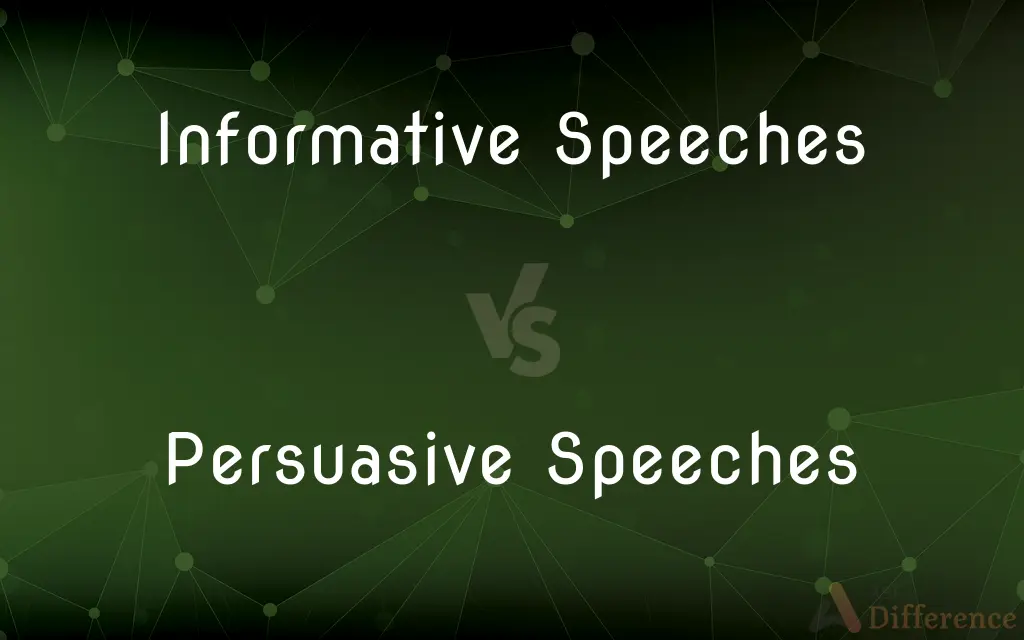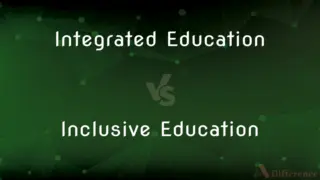Informative Speeches vs. Persuasive Speeches — What's the Difference?
By Tayyaba Rehman — Published on January 29, 2024
Informative Speeches aim to educate by presenting facts, while Persuasive Speeches intend to convince or influence opinions by presenting arguments.

Difference Between Informative Speeches and Persuasive Speeches
Table of Contents
ADVERTISEMENT
Key Differences
Informative Speeches primarily focus on educating the audience with facts, data, and unbiased information. They strive for clarity and understanding, often covering topics like history, science, or how-to guides. In contrast, Persuasive Speeches aim to sway the audience's beliefs or actions. They use emotional appeals, logical arguments, and rhetorical strategies to convince listeners, often addressing topics like politics, social issues, or product endorsements.
In Informative Speeches, the speaker acts as a neutral educator or presenter, avoiding personal opinions to maintain objectivity. The content is typically structured to enhance understanding and retention. Persuasive Speeches, however, often reflect the speaker's personal stance or agenda. The speaker uses persuasive language, emotional appeals, and rhetorical devices to build a compelling case, aiming to alter the audience's perspective or behavior.
Informative Speeches use clear, straightforward language to enhance comprehension. They rely on factual evidence, statistics, and expert testimony to inform the audience. Persuasive Speeches, in contrast, employ language that is more emotive and suggestive. They might use anecdotes, rhetorical questions, and persuasive techniques like ethos, pathos, and logos to build a compelling argument.
The success of Informative Speeches is measured by the audience's increased knowledge or understanding of the topic. These speeches are often found in educational settings, seminars, or informational briefings. Persuasive Speeches gauge success by the change they effect in attitudes, beliefs, or actions. They are common in advertising, political campaigns, and advocacy.
Informative Speeches prioritize accuracy and depth of information, often requiring extensive research and validation. They present all sides of a topic to provide a comprehensive view. Persuasive Speeches, while also fact-based, selectively present information that supports their argument. They prioritize emotional resonance and logical appeal over comprehensive coverage of a topic.
ADVERTISEMENT
Comparison Chart
Primary Objective
To educate and inform
To convince or persuade
Language Style
Neutral, factual, explanatory
Emotive, suggestive, argumentative
Speaker’s Role
Educator, presenter of facts
Advocate, influencer
Measurement of Success
Increased knowledge/understanding
Changed opinions/actions
Approach to Information
Unbiased, comprehensive coverage
Selective, argument-supportive
Compare with Definitions
Informative Speeches
An Informative Speech provides factual, unbiased information on a specific subject.
In her Informative Speech on climate change, she detailed the scientific evidence of global warming.
Persuasive Speeches
Persuasive Speeches are characterized by their goal of altering the listener's perspective or behavior.
Her Persuasive Speech on education reform was influential in changing the audience's views.
Informative Speeches
They are neutral presentations intended to inform listeners without bias or persuasion.
The biologist's Informative Speech on endangered species stuck strictly to facts and figures.
Persuasive Speeches
These speeches use emotional appeals and logical arguments to sway opinions.
In her Persuasive Speech, she used personal stories to advocate for mental health awareness.
Informative Speeches
These speeches focus on delivering knowledge and understanding in a clear, concise manner.
Her Informative Speech on healthy eating habits was straightforward and easy to comprehend.
Persuasive Speeches
They present selective information to form a compelling case for a particular viewpoint.
His Persuasive Speech on veganism highlighted the ethical and environmental benefits, persuading many.
Informative Speeches
Informative Speeches aim to educate the audience about a topic without persuading them.
His Informative Speech on the history of the internet was enlightening and purely educational.
Persuasive Speeches
Persuasive Speeches often include rhetorical strategies to convince the audience.
The politician's Persuasive Speech employed strong rhetoric to rally support for the policy.
Informative Speeches
Informative Speeches present data, statistics, and evidence to explain a topic thoroughly.
The doctor's Informative Speech on heart disease included current research and health statistics.
Persuasive Speeches
Persuasive Speeches aim to influence the audience's beliefs or actions through argumentation.
His Persuasive Speech on renewable energy passionately argued for a shift away from fossil fuels.
Common Curiosities
What is the main goal of an Informative Speech?
To educate the audience about a topic, providing factual and unbiased information.
What makes the language in Persuasive Speeches different?
It includes emotive, suggestive, and argumentative language to persuade.
How is success measured in Informative Speeches?
By the increased knowledge or understanding of the audience about the topic.
Where are Informative Speeches commonly found?
In educational settings, seminars, and informational briefings.
How does a Persuasive Speech differ in its objective?
A Persuasive Speech aims to convince or influence the audience's opinions or actions.
What kind of language is used in Informative Speeches?
Neutral, factual, and explanatory language to enhance understanding.
What indicates success in a Persuasive Speech?
Success is seen in changed opinions, attitudes, or actions of the audience.
Can Informative Speeches contain personal opinions?
No, they are meant to be unbiased and purely informative, avoiding personal opinions.
How important is audience interaction in Persuasive Speeches?
Very important, as engaging the audience emotionally and logically is key to persuasion.
Are Persuasive Speeches based on facts?
Yes, but they selectively use facts to support a specific argument or viewpoint.
Do Informative Speeches present multiple perspectives?
Yes, they aim to provide a comprehensive view of the topic.
Can an Informative Speech become a Persuasive Speech?
If it starts including persuasive elements and aims to influence, it can shift towards being a persuasive speech.
In what contexts are Persuasive Speeches typically given?
In advertising, political campaigns, advocacy, and motivational contexts.
How do Persuasive Speeches handle opposing viewpoints?
They may acknowledge them but primarily focus on arguments supporting their stance.
Is audience interaction important in Informative Speeches?
It can be used for clarity and understanding, but it's not the primary focus.
Share Your Discovery

Previous Comparison
Make of a Car vs. Model of a Car
Next Comparison
Integrated Education vs. Inclusive EducationAuthor Spotlight
Written by
Tayyaba RehmanTayyaba Rehman is a distinguished writer, currently serving as a primary contributor to askdifference.com. As a researcher in semantics and etymology, Tayyaba's passion for the complexity of languages and their distinctions has found a perfect home on the platform. Tayyaba delves into the intricacies of language, distinguishing between commonly confused words and phrases, thereby providing clarity for readers worldwide.
















































